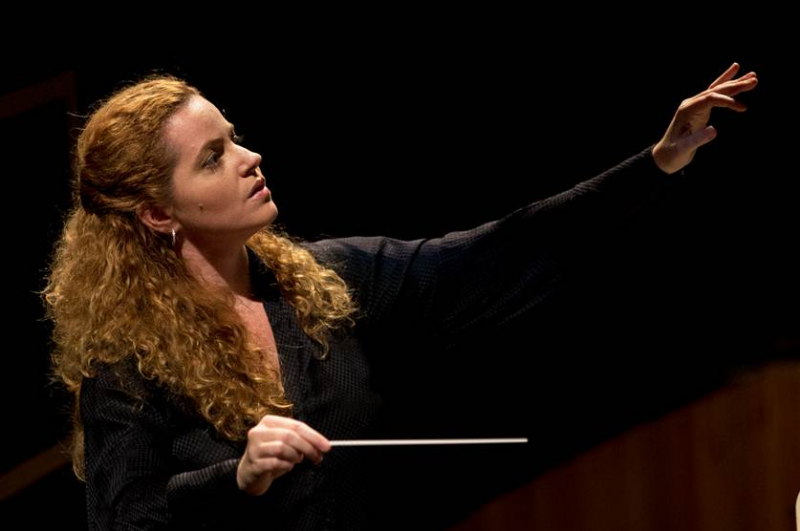Royal Liverpool Philharmonic Chorus and Orchestra, Scapucci, Liverpool Philharmonic Hall | reviews, news & interviews
Royal Liverpool Philharmonic Chorus and Orchestra, Scapucci, Liverpool Philharmonic Hall
Royal Liverpool Philharmonic Chorus and Orchestra, Scapucci, Liverpool Philharmonic Hall
Conductor’s début follows the path of other greats

The Royal Liverpool Philharmonic has something of a track record when it comes to finding conductors destined for great heights. After all, Sir Simon Rattle was a player in Merseyside Youth Orchestra and started his conducting career in Liverpool. The latest RLPO concert, following that great tradition, included a new face. And what an impact she made.
Speranza Scapucci has made rather a name on the opera circuit. She’s worked alongside Muti at the Met in New York, as well as in Salzburg and Rome. She’s worked with the Vienna State Opera, Chicago Lyric, Santa Fe Opera, New York City Opera and, closer to home, Glyndebourne and Scottish Opera. And here she was in Liverpool, conducting a mini opera.
It’s often said that the Requiem was Verdi’s best opera. Is the Stabat Mater Rossini’s best operatic effort? Quite possibly. The efforts of the Royal Liverpool Philharmonic Choir went a long way to confirming that. As always, this 100-plus chorus were disciplined and diction perfect (thanks, in no small part, to chorus master Ian Tracey). They were ever responsive to the requirements of the conductor. Their barely audible start to the Rossini set the scene almost perfectly. But all was not necessarily well. In the "Eia Mater" movement, for instance, the men felt shaky, almost as if sight-reading the piece.
 The Royal Liverpool Philharmonic Orchestra, usually so reactive to the needs of the choir, were just occasionally overpowering, certainly as far as the soloists were concerned. The tenor, Lawrence Brownlee (pictured right by Ken Howard), who had a splendidly flexible voice, was often drowned out by the orchestra.
The Royal Liverpool Philharmonic Orchestra, usually so reactive to the needs of the choir, were just occasionally overpowering, certainly as far as the soloists were concerned. The tenor, Lawrence Brownlee (pictured right by Ken Howard), who had a splendidly flexible voice, was often drowned out by the orchestra.
There were some splendid moments from bass Luca Dall’Amico and mezzo-soprano Silvia tro Santafé. The bass solo in "Pro peccatis" was especially profound. But most notable was the balance and equilibrium obtained by this quartet: the "Sancta Mater" was particularly moving. But when it came to the unaccompanied penultimate movement of the work, this was a moment to savour. And then into the hugely disciplined double fugue at the end. The massive pauses, where the hall was totally silent and the choir so superbly disciplined, heightened the drama considerably.
The concert opened with a disciplined interpretation of Schubert’s Overture in the Italian Style in D (D590). From an almost imperceptible opening, Scappucci drove the piece into a sprightly development. The RLPO woodwind were particularly elegant, bubbling away as the work progressed.Soprano Marina Rebeka was something of a disappointment in Mozart’s Exultate, jubilate (as she was in the Rossini). She had her head buried in the score for most of the performance and avoided eye contact with the sell-out audience. Nerves? Unfamiliarity? Who knows? Still, this was a confident performance. The voice lacked excessive vibrato and felt suited to the period. Runs were clear, the clarity excellent. What a shame that it felt rather apologetic.
rating
Explore topics
Share this article
The future of Arts Journalism
You can stop theartsdesk.com closing!
We urgently need financing to survive. Our fundraising drive has thus far raised £49,000 but we need to reach £100,000 or we will be forced to close. Please contribute here: https://gofund.me/c3f6033d
And if you can forward this information to anyone who might assist, we’d be grateful.

Subscribe to theartsdesk.com
Thank you for continuing to read our work on theartsdesk.com. For unlimited access to every article in its entirety, including our archive of more than 15,000 pieces, we're asking for £5 per month or £40 per year. We feel it's a very good deal, and hope you do too.
To take a subscription now simply click here.
And if you're looking for that extra gift for a friend or family member, why not treat them to a theartsdesk.com gift subscription?
more Classical music
 Helleur-Simcock, Hallé, Wong, Bridgewater Hall, Manchester review - moving lyricism in Elgar’s concerto
Season opener brings lyrical beauty, crisp confidence and a proper Romantic wallow
Helleur-Simcock, Hallé, Wong, Bridgewater Hall, Manchester review - moving lyricism in Elgar’s concerto
Season opener brings lyrical beauty, crisp confidence and a proper Romantic wallow
 Kohout, Spence, Braun, Manchester Camerata, Huth, RNCM, Manchester review - joy, insight, imagination and unanimity
Celebration of the past with stars of the future at the Royal Northern College
Kohout, Spence, Braun, Manchester Camerata, Huth, RNCM, Manchester review - joy, insight, imagination and unanimity
Celebration of the past with stars of the future at the Royal Northern College
 Jansen, LSO, Pappano, Barbican review - profound and bracing emotional workouts
Great soloist, conductor and orchestra take Britten and Shostakovich to the edge
Jansen, LSO, Pappano, Barbican review - profound and bracing emotional workouts
Great soloist, conductor and orchestra take Britten and Shostakovich to the edge
 Jakub Hrůša and Friends in Concert, Royal Opera review - fleshcreep in two uneven halves
Bartók kept short, and a sprawling Dvořák choral ballad done as well as it could be
Jakub Hrůša and Friends in Concert, Royal Opera review - fleshcreep in two uneven halves
Bartók kept short, and a sprawling Dvořák choral ballad done as well as it could be
 Hadelich, BBC Philharmonic, Storgårds, Bridgewater Hall, Manchester review - youth, fate and pain
Prokofiev in the hands of a fine violinist has surely never sounded better
Hadelich, BBC Philharmonic, Storgårds, Bridgewater Hall, Manchester review - youth, fate and pain
Prokofiev in the hands of a fine violinist has surely never sounded better
 Monteverdi Choir, ORR, Heras-Casado, St Martin-in-the-Fields review - flames of joy and sorrow
First-rate soloists, choir and orchestra unite in a blazing Mozart Requiem
Monteverdi Choir, ORR, Heras-Casado, St Martin-in-the-Fields review - flames of joy and sorrow
First-rate soloists, choir and orchestra unite in a blazing Mozart Requiem
 Cho, LSO, Pappano, Barbican review - finely-focused stormy weather
Chameleonic Seong-Jin Cho is a match for the fine-tuning of the LSO’s Chief Conductor
Cho, LSO, Pappano, Barbican review - finely-focused stormy weather
Chameleonic Seong-Jin Cho is a match for the fine-tuning of the LSO’s Chief Conductor
 Classical CDs: Shrouds, silhouettes and superstition
Cello concertos, choral collections and a stunning tribute to a contemporary giant
Classical CDs: Shrouds, silhouettes and superstition
Cello concertos, choral collections and a stunning tribute to a contemporary giant
 Appl, Levickis, Wigmore Hall review - fun to the fore in cabaret and show songs
A relaxed evening of light-hearted fare, with the accordion offering unusual colours
Appl, Levickis, Wigmore Hall review - fun to the fore in cabaret and show songs
A relaxed evening of light-hearted fare, with the accordion offering unusual colours
 Lammermuir Festival 2025, Part 2 review - from the soaringly sublime to the zoologically ridiculous
Bigger than ever, and the quality remains astonishingly high
Lammermuir Festival 2025, Part 2 review - from the soaringly sublime to the zoologically ridiculous
Bigger than ever, and the quality remains astonishingly high
 BBC Proms: Ehnes, Sinfonia of London, Wilson review - aspects of love
Sensuous Ravel, and bittersweet Bernstein, on an amorous evening
BBC Proms: Ehnes, Sinfonia of London, Wilson review - aspects of love
Sensuous Ravel, and bittersweet Bernstein, on an amorous evening
 Presteigne Festival 2025 review - new music is centre stage in the Welsh Marches
Music by 30 living composers, with Eleanor Alberga topping the bill
Presteigne Festival 2025 review - new music is centre stage in the Welsh Marches
Music by 30 living composers, with Eleanor Alberga topping the bill

Add comment